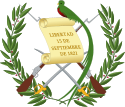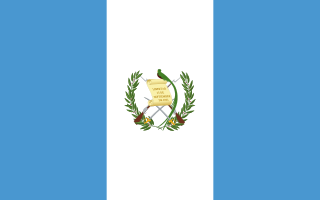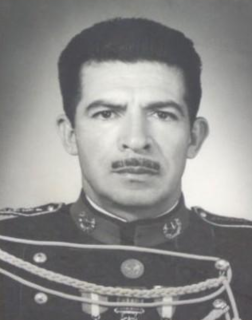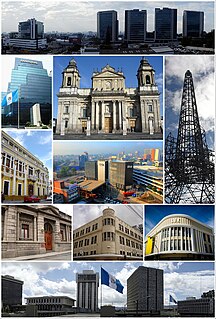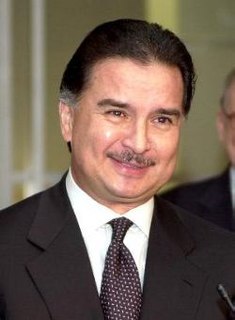
Alfonso Antonio Portillo Cabrera is a Guatemalan politician who served as President of Guatemala from 2000 to 2004.

The National Advancement Party is a conservative political party in Guatemala. It was founded in 1989.
The Grow Party formerly Grand National Alliance was a right-wing conservative political party in Guatemala. The acronym "GANA" also spells out the word gana, from the verb ganar, "to win".

The Institutional Republican Party, until 2013 known as the Guatemalan Republican Front, was a right-wing political party in Guatemala.

Marco Vinicio Cerezo Arévalo is a Guatemalan politician. He served as President of Guatemala from January 14, 1986 to January 14, 1991. He was the first president of the modern democratic era.

Zury Mayté Ríos Sosa de Weller is a Guatemalan politician. She is the daughter of the late general and President of Guatemala Efraín Ríos Montt. She served four terms in Congress, where she was Chair of the Foreign Relations Committee. She also served on the Steering Committee of the Inter-Parliamentary Union (IPU) and was the Chair of the IPU's Latin American Group where she was elected unanimously by parliamentarians from the Latin American nations. Zury was the presidential candidate for the party VIVA at the 2015 elections.

General elections were held in Guatemala on 7 March 1982. Ángel Aníbal Guevara, hand-picked successor of previous president Romeo Lucas García, was declared the winner of the presidential election and was scheduled to take office on 1 July. However, the election was widely denounced as fraudulent by elements on both sides of the political spectrum and an army-led coup d'état on 23 March instead installed the three-man junta of General Efraín Ríos Montt, General Horacio Maldonado Schaad, and Colonel Francisco Luis Gordillo Martínez.

Podemos previously: Movimiento Reformador is a liberal party in Guatemala. It is led by Jorge Briz Abularach.
The National Solidarity Party was a political party in Guatemala.
Guatemalan Christian Democracy was a political party in Guatemala. A moderate, reformist and anti-Communist party, it was a member of Christian Democrat International.

A general election was held in Guatemala in two rounds on 9 September and 4 November 2007. Voters went to the polls to elect a new President and Vice President of the Republic, 158 congressional deputies, and 332 mayors.
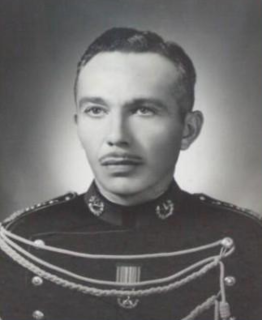
General elections were held in Guatemala on 3 March 1974. No candidate received more than 50% of the vote in the presidential election, resulting in Kjell Eugenio Laugerud García being elected president by Congress on 12 March. The Congressional elections were won by an alliance of the Institutional Democratic Party and the National Liberation Movement. Voter turnout was 46.41% in the presidential election.

Otto Fernando Pérez Molina is a Guatemalan politician and retired military officer, who was President of Guatemala from 2012 to 2015. Standing as the Patriotic Party candidate, he lost the 2007 presidential election but prevailed in the 2011 presidential election. During the 1990s, before entering politics, he served as Director of Military Intelligence, Presidential Chief of Staff under President Ramiro de León Carpio, and as chief representative of the military for the Guatemalan Peace Accords. On being elected President, he called for the legalization of drugs.

General elections were held in Guatemala on 1 March 1970. No candidate received over 50% of the vote in the presidential election, resulting in Carlos Manuel Arana Osorio being elected by Congress on 21 March. The National Liberation Movement-Institutional Democratic Party alliance won the Congressional elections. Voter turnout was 53.82% in the presidential election and 53.26% in the Congressional elections.

General elections were held in Guatemala on 12 November 1995, with a second round of the presidential elections held on 7 January 1996. Álvaro Arzú of the National Advancement Party won the presidential election, whilst his party also won the Congressional elections. Voter turnout was 46.8% on 12 November and 36.9% on 7 January.

General elections were held in Macedonia on 16 October 1994 to elect a President and Assembly, with a second round of Assembly elections on 30 October. The presidential election was won by Kiro Gligorov of the Alliance for Macedonia, whilst the parties forming Alliance for Macedonia also won the Assembly elections with 95 of the 120 seats. However, the second round of the Assembly elections were boycotted by VMRO-DPMNE and the Democratic Party, as they claimed there had been irregularities in the first round.
